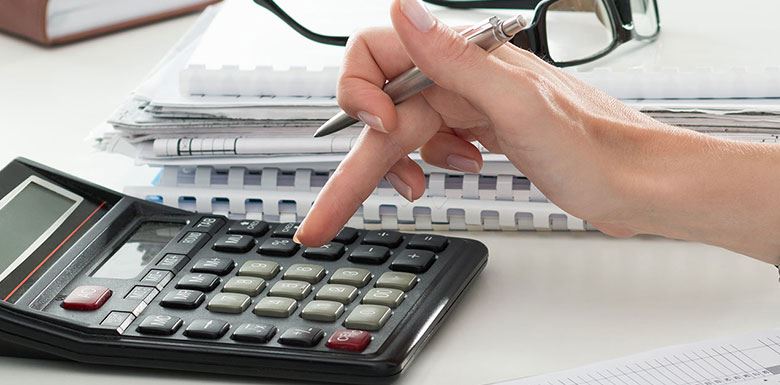How to find an accountant
 In this article
In this article
For most people setting up their own business, it’s safe to say that many primary business decisions are going to be based on their core skills and experience, rather than getting a thorough understanding of the ins and outs of business finance.
Of course, not all of us are as equally skilled with the financial side of running a company as we are with the physical side of the job, which can make the whole process of balancing the books more than a little confusing – fortunately, this is where an accountant can help!
Experts in the field of finance, finding an accountant to work with your business can make the process of managing your company’s costs and expenses that much easier, whether that be understanding business tax for sole traders or what’s expected of you when it comes to PAYE and VAT.
Read on to learn more about how to find a good accountant, and what they can do for your business.
How to choose an accountancy firm
When it comes to the process of finding an accountant, there are several things you’re going to want to consider before picking the accountancy firm of your choice. We recommend looking at the following before you make your decision:
- Look for a specialist firm – it’s always a good idea to look for an accountancy firm that specialises in your specific trade or small-business accounting in general, and ideally one that has clients the same size as your business. Not only will they have services tailored more towards your needs, but they’re more likely to be up to date with any changes in regulation and allowances that affect you.
- Pick a firm who offers the services you need – accountants can cover everything from basic book-keeping, PAYE, VAT advice, personal tax, business tax, year-end accounts, tax returns, and more, though not all firms offer a full comprehensive list. Therefore, it’s definitely worth finding an accountant that covers all the services you think you’ll need assistance with.
- Select a firm recognised by an official body – when working with something as delicate as finance, it’s absolutely essential that you find an accountancy firm who is a registered member of an officially recognised UK accountancy body, such as the ICAEW (Institute of Chartered Accountants in England & Wales) or ACCA (Association of Chartered Certified Accountants).
- Find a firm with affordable fees – like with anything business expense-related; you’ll need to be sure that you can afford the fees associated with your accountant before hiring them in order to make such a service financially worth it.
On top of these points, you should also make sure you only work with a firm that has in-date public liability insurance and personal indemnity insurance and appropriately qualified staff with recognised accountancy training – that way you can be sure that they know what they’re doing.
Finally, make sure that you speak with multiple different firms and get various quotes before making a decision to ensure you find a firm who can accommodate both your needs and your budget.
What can an accountant help me with?
When it comes to the services that an accountant can offer, you can expect most accountancy firms to provide a mix of some or all of the following areas:
- General bookkeeping
- Annual accounts
- Small business tax
- Financial compliance
- Sourcing funding for growth
- Developing your business plan
- Exit planning
Naturally, certain more specialised accountants may offer more niche services that are tailored towards specific businesses, so it’s always worth asking about their full-service range when making inquiries.
What should you do when meeting an accountant?
Once you have several suitable accountancy candidates in mind, your next step should be to prepare for your initial meeting with them in order to correctly assess whether or not their suitable for your business.
We recommend preparing for your meeting by doing the following beforehand:
- Check that your initial meeting will be free of charge before committing to it.
- Make sure that you’re meeting the individual, or someone skilled in the same areas, who would actually deal with your work within the company to ensure that they are able to accommodate the kinds of financial work you require.
- Ask for the firm to provide references that provide confirmation of their quality of work and service range.
- Ask about their various fees, what they cover, and when they are payable so you know what will be included in their work, any extra charges that may apply, and that you can meet the required costs for their work.
- Ask about their response times and how long you may need to wait before they’re able to answer any questions you may have outside of a face-to-face meeting.
Out of all of the above points we’ve mentioned, it’s definitely worth checking and avoiding any accountants who ask for payment for any initial quote or consultation meetings where possible.
As Clive Lewis, Head of Enterprise at ICAEW (Institute of Chartered Accountants in England and Wales - one of UK accounting’s regulatory bodies) points out, everyone is obliged to a free, no-obligation advice session with a Business Advice Service (BAS) chartered accountant.
If you search the ‘Find an accountant’ section on the BAS website and look for accountants local to you with a BAS logo, you can contact them and arrange your free meeting.
How do I know if an accountant is right for me?
At the end of the day, the right accountant for your business will be one who provides the types of financial services you need, has the necessary qualifications to work in the industry, provides fees that sit within your intended budget, and is someone that you feel as though you’ll be able to work with.
If you do speak with an accountant who meets all the criteria you expect, but you feel like you may struggle to form a good working relationship with them, then there’s no harm in passing on their services and looking elsewhere – after all, accountancy is a two-way street, and you want to be sure that the accountant you choose will be easy to work with.
What to expect from your accountant
Once you’ve finally decided on your accountancy firm of choice, they’ll issue you with a ‘letter of engagement’. This is a contract that sets out the terms and conditions of your agreement with them, and you’re required to sign it before your accountant can begin working for you.
From here, you should keep in touch with your accountant throughout the year, meeting virtual, in-person, or over the phone at least once a month to discuss any updates, service amendments, and regulation changes that may have occurred recently, as well as assisting your accountant with providing documentation when required.
Being organised with financial records on your end is a surefire way to make working with your accountant a much more straightforward process and will make the whole thing a far smoother working relationship.
Get access to additional legal and wellness advice as a Trusted Trader
As a Which? Trusted Trader, you’ll get free legal advice and wellness helplines as part of your membership package.
Not only that, but all of our Trusted Traders get their very own business profile to display reviews and work, as well as a dedicated account manager to assist them day to day. Get in touch today or visit our advice guide hub for more useful financial articles like this one.
Become a Trusted Trader
When customers see you displaying our logo, they'll know you're a trader they can trust
Find out more




